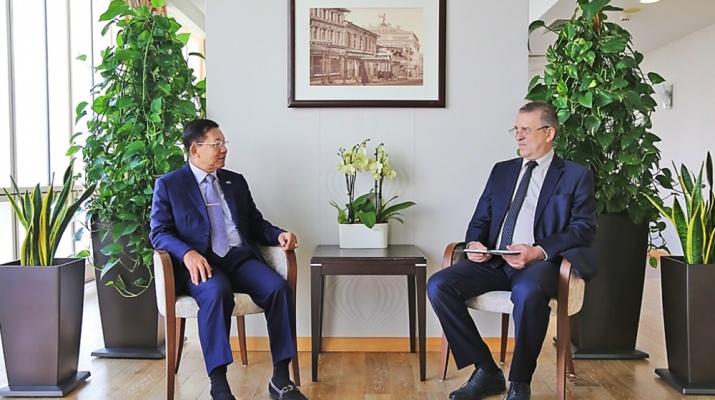YANGON—A few months ahead of November’s general election, Myanmar military chief Senior General Min Aung Hlaing hinted at the possibility of his entering politics, during a recent visit to Russia.
When asked about “his role in the upcoming general elections” in an interview with Russian media outlet Arguments and Facts, he said his first priority, as in previous general elections, was to help ensure that a free and fair vote is held. After the election result is known, he said he would continue to work based on the wishes of the political parties, groups and people, according to a Burmese-language transcript of the interview posted on his website.
Many critics and observers believe the military chief is eying a run for the presidency when his tenure ends after this year’s election. The commander-in-chief turned 60 (the retirement age for civil servants) in July 2016, but rather than voluntarily retire he instead extended his term.
In his answer to the question from Arguments and Facts, the military chief said he has 40 years of experience in political, military and administrative affairs. He said that during this period he had served the nation and the people, adding that he would continue to serve in whatever role was needed.
“I believe that those experiences will be valuable in serving the nation and the public,” the commander-in-chief said.
Under the Constitution, being well acquainted with the affairs of the Union, such as political, administrative, economic and military issues, is one of the qualifications for serving as president.

According to Myanmar’s presidential election process, the president and vice presidents are elected by the Union Parliament, not directly by voters in a general election. The process begins with each of three groups—elected members of the Lower House, elected members of the Upper House and unelected military representatives—electing their respective vice presidents. The three groups then vote together to elect one of the three as the President.
Given this system, Snr-Gen Min Aung Hlaing doesn’t need to contest the election to take the country’s top office. He could simply instruct his appointed military representative in Parliament to select him as a vice president.
Myanmar’s two previous general elections were held in 2010 and 2015. The 2010 election, organized by the then military junta, was boycotted by many ethnic parties and the National League for Democracy (NLD) and widely dismissed by the public. The military proxy Union Solidarity and Development Party (USDP) came into power after that election. In 2015, the NLD defeated the USDP and took office.
Late on Monday, Myanmar’s Union Election Commission announced the constituencies for the upcoming general election. According to the announcement, there will be 330 constituencies for the Lower House, 168 for the Upper House, 644 for state and regional parliaments, and 29 for ethnic affairs minister positions in the states and regions, totaling 1,171 parliamentary seats up for grabs nationwide. The election date is due to be announced soon.
Arguments and Facts also asked Snr-Gen Min Aung Hlaing when the military would remove its unelected representatives from Myanmar’s Parliament.
The military chief said the military would give up its reserved 25 percent of seats in all parliaments when the country’s political transition is stable and mature.
You may also like these stories:
Myanmar Military Says It Won’t Control How Personnel Vote in Upcoming Election
Myanmar Heads of State, Ministers Acquire Land in Capital
Local Officials Resign En Masse in Myanmar’s Conflict-Torn Rakhine State

















